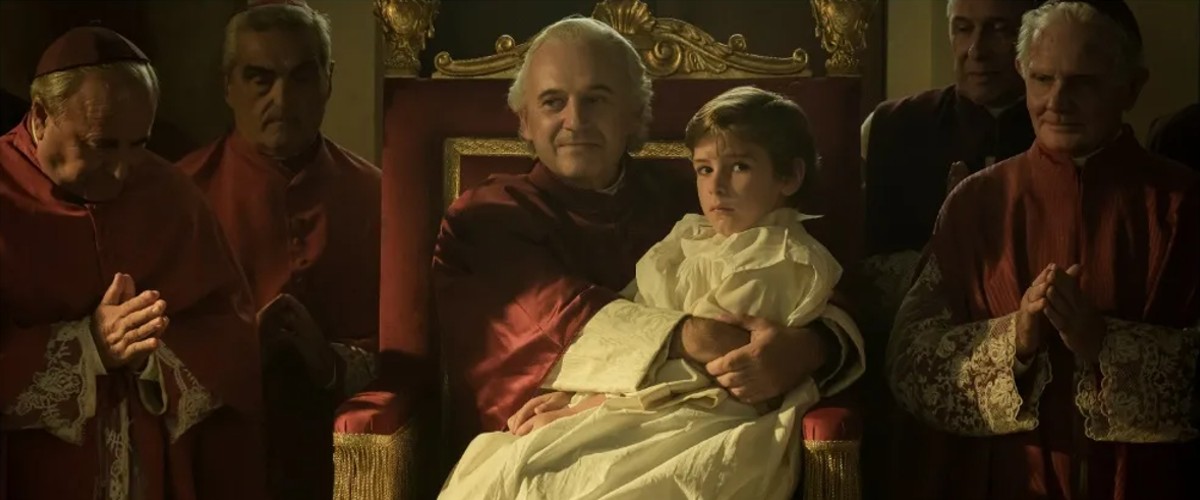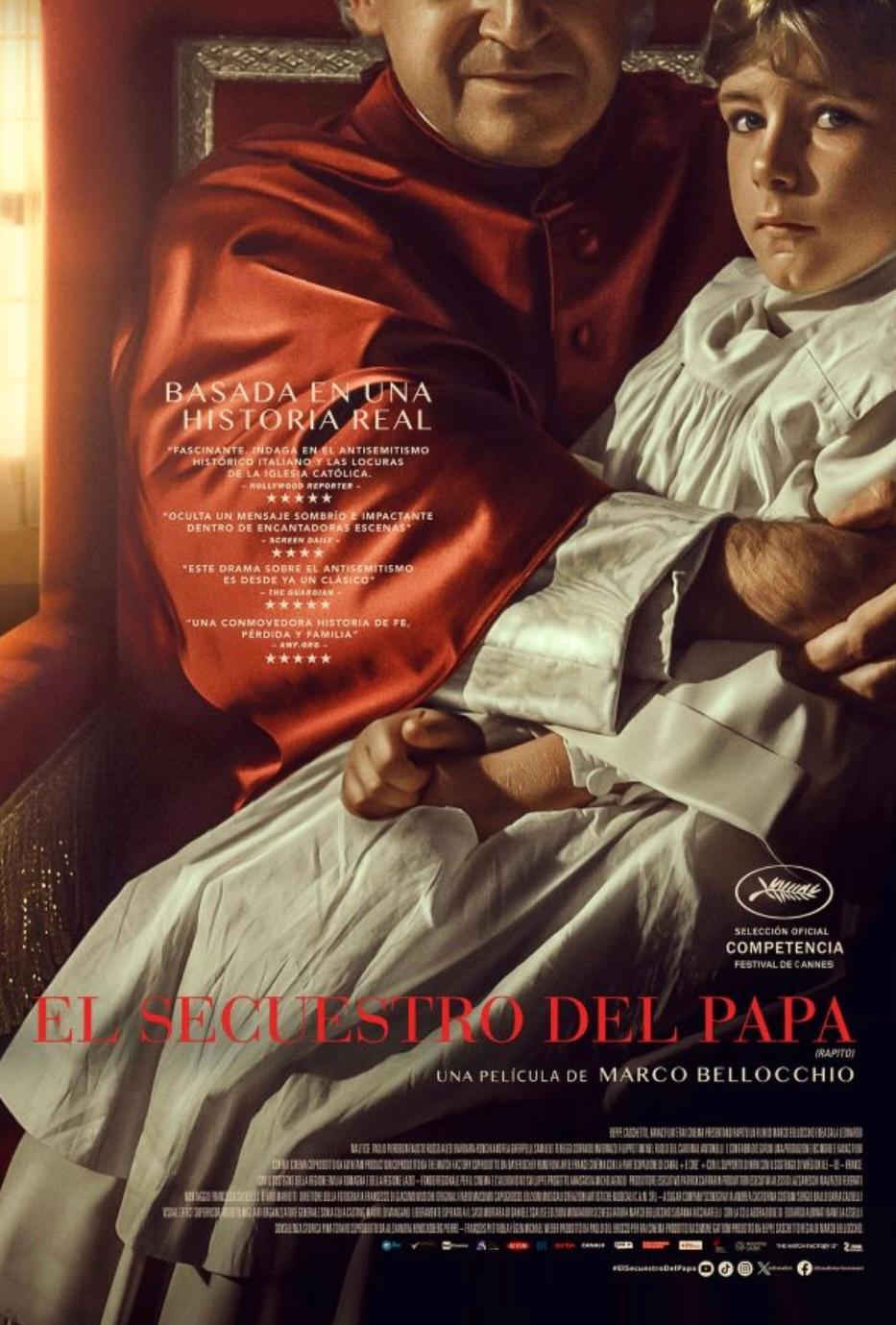Set in 1800s Italy and based on a true story, “Kidnapped” is so primally upsetting that you would think it would be unbearable to watch. But it proves intoxicating, at times nearly overwhelming, thanks to perfect casting, an economical and impassioned screenplay, and filmmaking overseen by 84-year-old cowriter-director Marco Bellocchio, who might be one of the greatest living narrative filmmakers who is not usually recognized as such.
In 1857 in Bologna, a part of Italy that was then controlled by the Papal States, an infant Jewish boy named Edgardo Mortara is impulsively baptized by his family’s babysitter, a Catholic teenager. By the time the boy turns six, knowledge of the unauthorized ceremony reaches the local inquisitor Father Pier Gaetano Feletti (Fabrizio Gifuni). Feletti sends police to take the boy from his family, citing a Papal States policy forbidding Christians from being raised by members of other faiths. The Mortaras are told that the boy can remain with them if everyone in the household (including Edgardo’s six siblings) converts. Edgardo’s father Salomone “Momolo” (Fausto Russo Alesi) and mother Marianna (Barbara Ronchi) pick a third, agonizingly difficult path: let the boy be taken away and retain their household’s religious and cultural identity while fighting church and state through the legal system and the newspapers, in hopes of returning Edgardo to his birth family and pulling the whole establishment down.
It’s a seemingly impossible task. Time is not on the parents’ side. The movie takes place over a sixteen year span. Viewers know not only that the wheels of justice turn slowly when they turn at all, but that human beings are psychologically complex organisms that don’t always do as desired or expected, and are malleable. Edgardo is raised within the orbit of Pope Pius IX (Paolo Pierobon) while his family visits him periodically. We see the child grow up in new circumstances and become acclimated to them (Edgardo is played by Enea Sala as a boy and Leonardo Maltese as a young adult). After an early period of emotional chaos in which Edgardo alternates dutiful attempts to adjust to his new life and impulsive acts of rebellion/rejection (there’s also an attempt to steal him back) he does eventually become a Catholic, and a devout one at that. (A pair of rhyming images shows little Edgardo hiding under his mother’s skirts to escape the police early in the story, then later hiding under a priest’s frock coat during a game of hide-and-seek.)
There aren’t many scenarios more fundamentally appalling than the forced separation of children from their parents. “Kidnapped” builds upon and complicates that sense of violation even as it keeps cutting back to the family pursuing justice. The movie also provokes philosophical questions that exist alongside the fundamentals without making them too academic and extinguishing their fire: What does one do when a kidnapped person says they don’t want to be rescued? If you try to pull them away from their adaptive circumstances anyway, against their will, is that kidnapping?
“Kindapped” is also an astute study of power: how it’s acquired and maintained and exercised, and how poorly those who have gotten used to wielding it react after they wake up one morning and realize they’re about to lose at least some of what they’ve got. There’s no shortage of films about powerful organizations smashing individual families to pieces and the families trying to repair themselves and fight back, but few recent examples show the dynamics of oppression and resistance in such direct, non- denominational terms as “Kidnapped.” The opening scenes of little Edgardo and his family dealing with representatives of the Church are upsetting not just because of what’s happening but because the representatives of the oppressors are, for the most part, soft-spoken rather than flamboyantly cruel. At times they seem almost embarrassed at having to enforce policies that their own organization devised and implemented. There are rules and laws, you see? And they have to be followed. No hard feelings. It’s nothing personal.
Until it is: when a representative of a Jewish newspaper in Bologna gets an audience with the Pope and is essentially warned to knock it off, nearly as much attention is paid to the tone and presentation of the visitors’ statements as their substance. “Lower your voice and kneel down; have you forgotten whose presence you are in?” the Pope warns. Then he adds, “I could hurt you very badly. I could force you back into your hole. Do you remember when the ghetto gate was closed from dusk to dawn, or have you already forgotten?” When the tables are turned even slightly on Feletti by representatives of the (secular) legal system, he gets his back up at being challenged. “I would like to make clear that the decisions, the judgments of the Church, are not subject to any other authority of an inferior position,” he warns court officials who have come to interrogate him.
The movie depicts the 19th century Church as a corrupt, brutal, power-drunk organization that positioned itself as as a middleman between God and individuals in order to crush rival faiths, enforce patriarchy, guilt-trip most of the subjugated population into “donating” to them and obeying their edicts, and siphon off or steal material wealth and real estate. (Late in the movie, when it becomes clear that the Papal States are about to get smacked down by the secular government, the top bosses of the Church immediately begin discussing where to hide all the treasures they’ve amassed.)
And yet not one of the frocked characters conducts himself onscreen as a mustache-twirling bad guy. They’re shown mainly as bureaucrats in turned-around collars: company men. Pope Pius IX sometimes seems as if he’s about to turn into an especially hiss-able exception. But the way Pierobon plays him (with a childlike comportment and self-loathing undertone that evokes the late Ian Holm) you get the sense that he’s not merely twisted by life among the super-powerful, but that he’s also got mental problems that will never be properly diagnosed.
All this material is presented by Bellocchio and his co-screenwriter Susanna Nicchiarelli (a director herself) not as a cooly observed case study in which bare facts are laid out, but something more in the spirit of a grand, tragic opera, or an epic movie melodrama from an earlier time that that would’ve been shot either in burnished black-and-white or feverish Technicolor, depending on the decade. Francesco Di Giacomo’s cinematography seems to have been modeled on Old Masters like Rembrandt. There’s a hint of Gordon Willis’ work in the “Godfather” trilogy in the way that single-source lighting falls on clothing and faces. Fabio Massimo Capogrosso’s busy, booming orchestral score helps unify a script that might have otherwise seemed too terse or schematic. It regularly reminds you of which side the movie is on (the “kidnapping, bullying and oppression are bad” side) even when “Kidnapped” is investing its most disturbing characters with complexity—and reminding you that just because the main players have been reduced to just a wee bit more than their plot functions in the interests of efficiency (the running time is two hours and change) doesn’t mean they aren’t full human beings.
“Kidnapped” might turn out to be one of those films like the older classics it plainly models itself after, where, in the memory, you think of certain characters as richly detailed creations that you spent lots of time with, but they’d prove to have gotten just a few minutes’ total screen time if you sat in the dark with a stopwatch. The only thing I can say against it is that, its determination to get through it all as quickly and forcefully as possible, important part of the story happen offscreen, and other parts are confusing and the confusion is not always cleared up (though withholding the details of the early baptism until a courtroom scene near the end proves to be a masterstroke; it makes the entire tale seem even more tragic—and at the same time absurd).
This has been a great year for movies so far, and “Kidnapped” is another work of substance and style, telling its story with immediacy and a palpable sense of anger even as it channels the work of past masters dating back decades, even centuries.




















